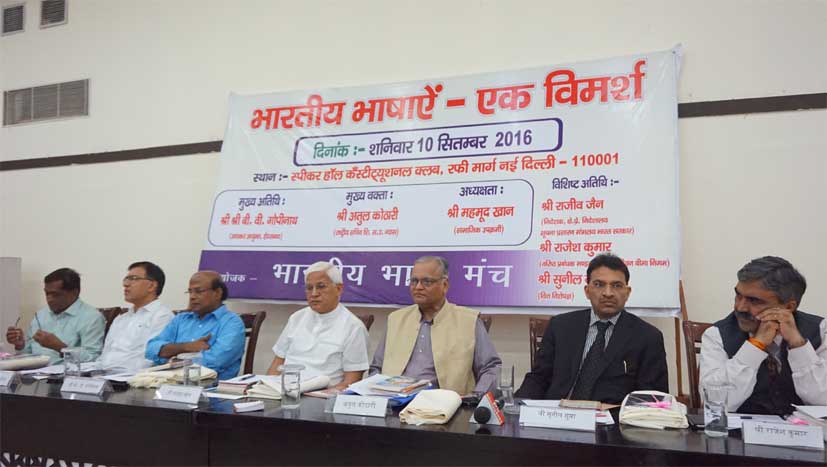He showed his pleasure on the growing acceptance of Hindi both within India and worldwide. There is a misconception within our country that Hindi is not a vernacular language in north east. In fact it is the most common way of expression there. Similarly south India is also not averse to Hindi anymore and masses are eager to learn Hindi. Around 100 countries worldwide and universities of the stature of Oxford, Harvard etc. are running course on Hindi. He conveyed his concern over the continuing legacy of British in the matters of languages. Divide and Rule policy of British is still causing linguistic rifts among our own.
One new born learns first lesson of wisdom from one’s own mother. Language which is used then is learnt most naturally and becomes the mother tongue for both talk and thoughts. Language of our thoughts is most suitable to express our work, contemplation and research. All developed nations adopted their mother languages a source of medium for all the education right from primary to higher education such as Medicine, Engineering and university education. Most developed and scientifically advanced nations such as Japan, Germany, France, South Korea, Italy, China, Russia, Israel etc. conduct all their businesses, education governance in their mother tongue. English is used nowhere. Taking high pride in mother tongue, many top ranking University Chancellors, Scientists and politicians of these countries do not feel any need to learn English. If need be, translators are available at their disposal on international forums.

On the contrary, in our country someone educated in vernacular language is disparaged and deemed less educated as compared to an English educated individual. After so many years since our independence, a common man feels helpless in front of Government officers, Lawyers and Doctors on account of communication inability posed by English language. If we want to stand shoulder to shoulder with other developed nations, we need to free ourselves from the clutched of this superimposed language. We need to make available all the fine knowledge within India and other developed nations through books and computers written and coded in Hindi and other vernacular languages. Scriptures written in German, French, Hibru and Japanese provide much better contents in the areas of science, philosophy and technology as compared to English scriptures. We ought to have erudite people in these languages who can translate knowledge and wisdom embedded in the scriptures written in these languages and make the same available in Indian languages. “Bhartiya Bhasha Manch” is working in this direction.
Shri Kothari reminded everyone that India is becoming a huge market. Multinational companies from developed economies are making use of Hindi to sell their products. These market dynamics are forcing these companies to learn Hindi and other Indian languages. Hence environment is very conducive for the spread of Hindi and other Indian Languages. We need to self-realize our strength. Intellectual capacity of Indian students far outweighs that of others. If the amount of time we spend on learning English can be spent on learning our own mother tongue, we can win many more Noble prizes. Scientific innovations thereof can put us in the category of other advanced economies.
Shri Mehmood Khan, International Leader of Uni-liver and a social worker, was the chairman for this program organized in constitution club on 10th Sept. Chief guest was IncomeTax commissioner Hyderabad, Shri B.V.GopinathJi.
Other distinguished Guests who were present on the occasion were:
1. Shri Rajiv Jain, Director in Information and Broadcasting Ministry.
2. Shri Rajesh Kumar, Manager LIC, Delhi Circle.
3. Shri Sushil Gupta, Manager LIC, Delhi Circle.
They too enlightened the gathering with their views and opinions.
Shri Dinanath Batra, National Chairman of “Shiksha Sanskriti Uthan Nyas” and a very senior educationist, also graced the occasion. Shri Nitin was handling the stage for this program.

